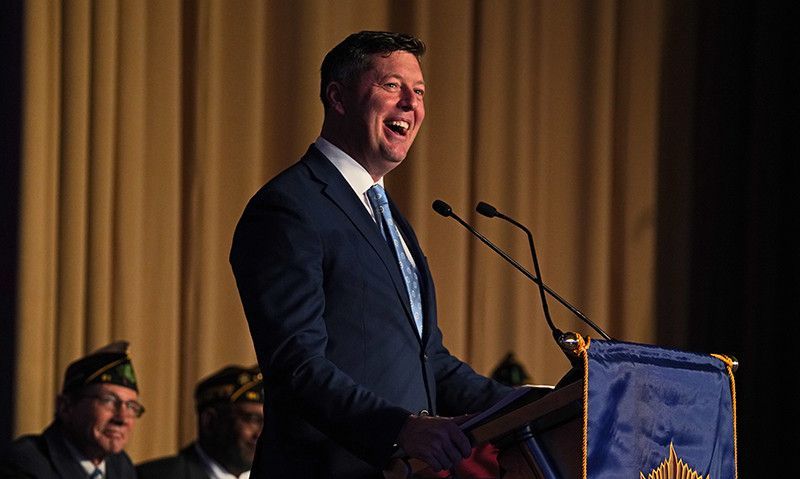
Task Force Movement chairman looks back at history to show that veterans today can reduce shortages in truck driving and cybersecurity.
Less than a year ago, Task Force Movement (TFM) was formed by the Biden administration to help lift the United States out of its supply-chain crisis by fast-tracking veterans into the commercial trucking industry. Since then, more than $11 million in scholarship funds have been secured by TFM to ease the burden for those who have served, or their spouses, who want to obtain commercial driver’s licenses.
The issue, Task Force Movement Chairman Patrick J. Murphy told hundreds of American Legion members Tuesday at the organization’s Washington Conference, is that 80,000 truck-driving jobs remain unfilled across the country. A similar shortage taken on by TFM: the number of unfilled cybersecurity positions, up to 60,000 in the federal government alone, and hundreds of thousands more in other sectors.
Murphy announced at the 103rd American Legion National Convention last August that TFM would open its new portal for veterans to move quickly and efficiently into cybersecurity positions.
Those two gaps can be filled with at least a portion of about 200,000 men and women who leave military service every year, Murphy suggested.
The first veteran of the war in Iraq to be elected to Congress (2007-2011, D-Pa.), Murphy reflected on the economic accomplishments of veterans over the last 75 years who came home to stimulate the U.S. economy, including those who started small businesses that became global brands like Nike, Walmart, Comcast and FedEx. That list also includes his grandfather, “who served in the Pacific in World War II, a Navy veteran, who came back and became an American Teamster and drove a truck for decades, put food on the table for the Murphy family … and my father, also a Navy veteran, who served during the Vietnam era, and came back and was a police officer and also drove a truck on the side.”
Today’s trucking jobs, Murphy told the Legionnaires, pay about $70,000 a year to start, more than is commonly believed, and daytime routes close to home represent the majority of the available opportunities.
With the U.S. Chamber of Commerce Foundation and more than 150 partners, including The American Legion, “We have already raised over $11 million in free scholarships for veterans and military spouses to get their commercial driver licenses, which cost, on average, about $11,000.”
He said TFM assistance is now also helping put Afghan refugees using Special Immigrant Visas qualify for jobs in the American trucking industry. “They stood with us, shoulder-to-shoulder, and put their lives on the line,” Murphy said. “We have an ethic in the military and in The American Legion – that we leave no one behind.”
He described this as “a defining moment in our country’s history. While the wars might be over in Iraq and Afghanistan, we still must compete, and we still must let the American public know that the American veteran is a leader of character, committed to a lifetime of service. Veterans are civic assets to this nation. They are more likely to be employed than non-veterans. They are more likely to start a small business. They are more likely to vote in elections … because they love this country.”
Murphy’s message also included a call for Legionnaires and veterans to tell the stories of those who have serve their country in the past and come home to strengthen the economy. “We have a lot to be proud of, but we must amplify their stories. We must amplify their cause, that there is a sacred duty to our nation, to continue to take that oath to support and defend the Constitution of the United States of America against all enemies, foreign and domestic, and continue to be civic assets and leaders of character in the greatest country on earth.”
- Washington Conference

